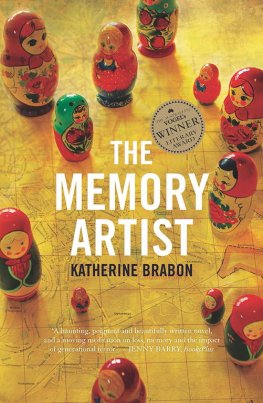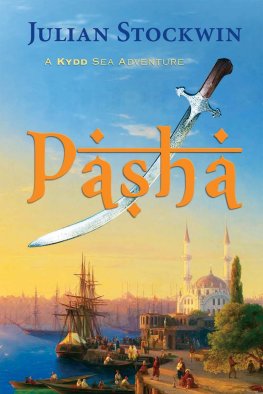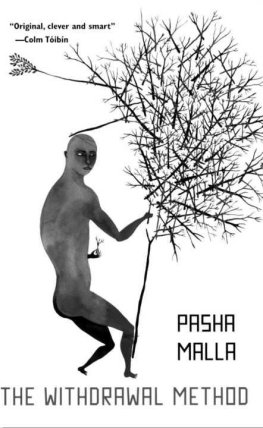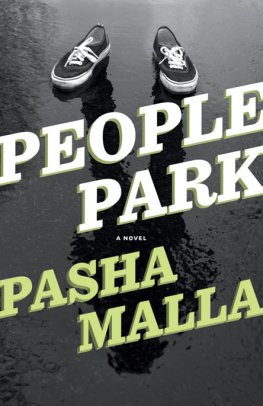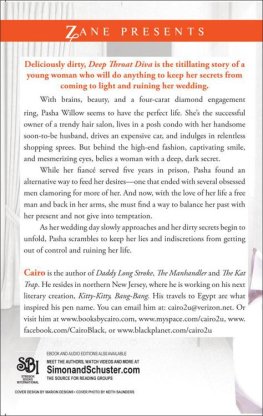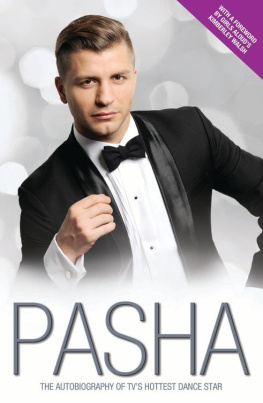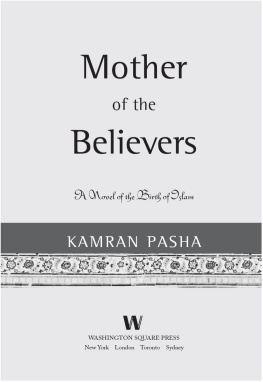Katherine Brabon
THE MEMORY ARTIST
For my parents, Nina and Martin,
and my sisters, Emily and Meredith
If you ask me, Did this happen? I will reply, No.
If you ask me, Is this true? I will say, Of course.
ELENA BONNER,
Mothers and DaughtersI was born in Moscow in 1964. Our apartment was a dvushka, two rooms and a small square of kitchen, in a Khrushchev-era concrete block. In that apartment of my childhood, uneven towers of paper, a precarious city, sprawled across the living room floor. On a glass-fronted bookshelf, photos of old dissidents, exiled writers and dead poets leant against the volumes and journals, looking out with silent faces. A narrow balcony faced the street.
Every child has their window, and from mine, in the kitchen, I could see only a narrow street, the tops of hats or umbrellas of people passing below, slanting shadows on the walls of the tower opposite and identical to ours, rain bouncing off bitumen, piles of snow and sometimes the old woman who cleared it away. On the windowsill were a few of those old meat tinsfrom the war years, my mother saidthat now held pencils and fake flowers.
Life was our kitchen table. Rectangular, not very big, metal legs; draped in a cream cloth with latticed edges, stitched flowers in orange, brown and yellow. It was mesmerising, for me as a boy, to see how our rooms could transform between morning and late evening. In the morning, the table, and therefore the apartment, had a certain stillness; there were only a few ripples in the tablecloth where the vase or a plate had nudged the material out of place. I could hear my mothers slippers on the linoleum floor, the tick of the gas boiler on the wall, the soft knock of tea glasses placed on the wooden shelf. Pasha, drink your tea, my mother would say to me.
By evening our kitchen table would be another place, crowded and always, it seemed to me, made more colourful by the noise and the people gathered there. Rather than a first memory, I grasped a first feeling, an impression of those evenings in my childhood.
Oleg would usually arrive first. He had broad shoulders but was thin, the sinews of his neck stretched as if to their limits. The veins on his hands resembled river lines on a map. His hair, neatly parted, was slightly wispy, and his eyes were a striking shade of light blue. There was one night, or many, when I was very young and Oleg was talking as usual with the adults gathered in our kitchen. From my seat I watched as he casually reached for a cloth to dry the very plate from which I had moments ago eaten my dinner, that my mother had washed in the sink. In its ease, the unspoken closeness of old friends, it was a gesture that comforted me. We had probably lost my father by then. Perhaps I craved the figure of another parent that Oleg seemed to embody.
And then the others would arrive for the gatheringor underground activist meeting, as I would later learn to call these evenings in our apartment. They greeted one another, taking glasses from the table or shelf, some talking loudly as they walked through the tiny entranceway from the hall, pausing by the door to take off their boots, others quieter, patting me on the shoulder. I could smell makhorka tobacco as if it drifted in with those tall figures, riding on the warmth of their wheezing laughs or the cold of the draught from the hallway. Since the table was so small, most stood leaning against the wall, the doorway, or the edge of the sink. Certain papers were sometimes lifted from beneath the linoleum on the floor. Oleg would turn the radio on, wink at me and say, Lets find out whats happening to us today, Pasha. And then voices from Radio Liberty, Voice of America, or the BBC would speak from the shiny mint-green Latvian radio that was moved to the table for those gatheringsanother object, like the kitchen table, that became so deeply woven into events of those years that it was something of a character in my memories. Such things seemed to hold an emotional personality as real as those of the people who, after all, would themselves become only memory objects of a kind.
And usually the typewriter, which spent its days either covered and hidden in the wardrobe, or on the kitchen table with my mother hunched over its keys, surrounded by papers, would take its heavy place on the table. The adults would grow serious; laughter would die down and Id notice the sharpness in the air as they looked to the typewriter, the waiting white paper. Darya, someone would say to my mother, Darya, make sure this is said include that name no, say it this way. My mothers long hair would be pulled back in a silken black bun, though a few strands always seemed to get in the way and she would push them aside, touch the frame of her glasses with forefinger and thumb. Her back made an incline as she leant over the typewriterlike a mountain, severe and strong. Id wander over sometimes, tired or wanting attention, and stand next to her while she typed.
Yes, Pasha, she would say, even if I hadnt asked a question. Sometimes one of her arms would find me, wrap around my waist, and shed let me hover at her side. I loved to follow the words as they appeared from nowhere on the expanse of white, like tiny figures running across a bare landscape. Standing there at the typewriter with her, surrounded by our friends, at the kitchen table that was our life, I was home.
Others would spend the time writing by hand, usually making samizdat copies of the same documentperhaps a banned poem or article. At the time, I wouldnt have known the meaning behind those typed and scrawled words, nor the weight between the lines. But listening to the care the dissident aunts and uncles took with each line, I learnt to revere them all the same.
Often I was allowed to sit on someones lap and listen, though at times I would be sent to bed on the divan behind a screen in the living room. The radios hum would reach my ears faintly, and murmurs or shuffling feet blurred into the edge of my sleep. I liked to see the yellow light thrown from the kitchen to the ceiling above me; it was forever connected in my mind to the dissidents presence there.
In the morning after those meetings, the apartment was always charged with something, a lingering vigour; the scent of tobacco, brandy, the winter dampness of coats; the sight of something left behind, a hat or an unfamiliar flower-patterned plate. Each was evidence of the night and the very different place our rooms seemed to become in those hours.

Years later, when I was no longer the little boy with fair hair and wide brown eyes, I would wonder what the dates were, or even the years, when shades of tension, sadness and anger seeped into the mood of those gatherings. It wasnt the dates or events I absorbed as a child, but the sightless shifts in the air, which harnessed themselves to memory and came to define my recollections.
Once, a woman whose name I never knew, or eventually forgot, entered the kitchen, sat down heavily on a chair and looked away from the table with wet cheeks. I was struck by the way her hands lay, upturned and inert, on her lap. My mother sat with the woman while others brought out bottles, crystalline vodka or golden brandy, and asked me where extra glasses were kept. A man I didnt know washed the biscuit plates at the end of the night because my mother did not leave the sad womans side.
Another time, Oleg looked at me with clouded red eyes and such an unfamiliar tension around his mouth (since it seemed to me he was always smiling) that I actually hid, pretending to read, on the floor by the couch in the other room. His sadness frightened me.

